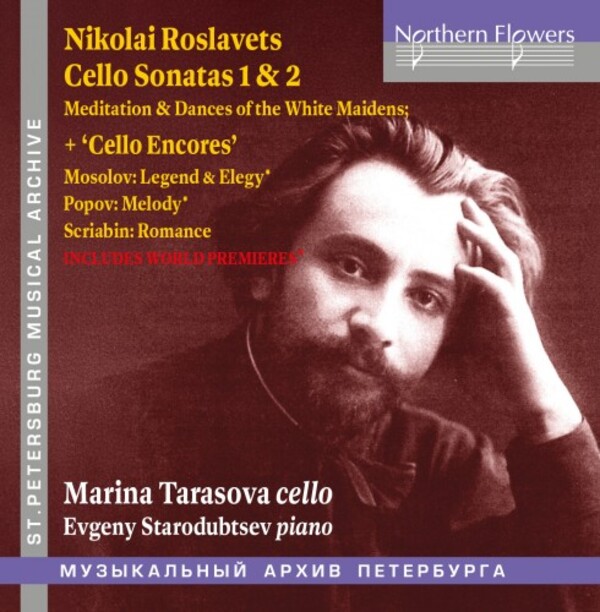ROSLAVETS Cello Sonatas 1 & 2 (Marina Tarasova)
View record and artist detailsRecord and Artist Details
Genre:
Chamber
Label: Northern Flowers
Magazine Review Date: 04/2025
Media Format: CD or Download
Media Runtime: 62
Mastering:
DDD
Catalogue Number: NFPMA99160

Tracks:
| Composition | Artist Credit |
|---|---|
| Elegy |
Alexandr Vasil'yevich Mosolov, Composer
Evgeny Starodubtsev, Piano Marina Tarasova, Cello |
| Legend |
Alexandr Vasil'yevich Mosolov, Composer
Evgeny Starodubtsev, Piano Marina Tarasova, Cello |
| Melody |
Gavriil Nikolayevich Popov, Composer
Evgeny Starodubtsev, Piano Marina Tarasova, Cello |
| Sonata for Cello and Piano No. 1 |
Nikolay Andreyevich Roslavets, Composer
Evgeny Starodubtsev, Piano Marina Tarasova, Cello |
| Cello Sonata No. 2 |
Nikolay Andreyevich Roslavets, Composer
Evgeny Starodubtsev, Piano Marina Tarasova, Cello |
| Dance of the White Girls |
Nikolay Andreyevich Roslavets, Composer
Evgeny Starodubtsev, Piano Marina Tarasova, Cello |
| Méditation |
Nikolay Andreyevich Roslavets, Composer
Evgeny Starodubtsev, Piano Marina Tarasova, Cello |
| Romance |
Alexander Scriabin, Composer
Evgeny Starodubtsev, Piano Marina Tarasova, Cello |
Author: Aleksander Laskowski
Nikolay Roslavets was born in 1881, the same year as Myaskovsky, Bartók and Enescu. His father worked for the railway, his grandfather was a carpenter. The legend – allegedly widespread among the lovers of his music in Russia – has it that Roslavets as a boy actually built his first violin in his grandfather’s workshop. He was friends with many leading artists of his day, including Malevich and Mayakovsky, and greeted the Russian Revolution with enthusiasm. He had a zeal for creating new things in music and followed his own system of sound organisation centred upon the ‘synthetic chord’ (hence he is sometimes referred to as the ‘Russian Schoenberg’).
Roslavets composed two cello sonatas, in 1921 and 1922 respectively. The first is more fiery and more abstract, the second – to my ears – more mellow and Scriabinesque. At least so it sounds in the classic recording by Alexander Ivashkin and Tatyana Lazareva. In the First Sonata I like Boris Pergamenschikov and Pavel Gililov even more, as they elegantly converse in this explosive musical dialogue (in what is a fiendishly difficult piece to play). Both Ivashkin and Pergamenschikov give you an impression that the rough edges in this music have been polished smooth in the river of time. The present recording by Marina Tarasova and Evgeny Starodubtsev is a successful attempt at reconstructing the original roughness of these pieces. The cello is stentorian and at times shrill, the piano august and indomitable, giving both sonatas a flavour of revolutionary zeal, if not frenzy.
After the sonatas comes a hefty portion of well performed encores by Roslavets, Alexander Mosolov, Gavriil Popov and, as kind of soothing epilogue, Romance in A minor by Alexander Scriabin. With this recording, Tarasova and Starodubtsev make a strong case for this music. Given that the repertoire is little known and there are two premiere recordings, it is a pity that Gregor Tassie’s booklet notes are sketchy and often puzzling, especially as it is difficult to otherwise find any information about this music if you do not read Russian.
Discover the world's largest classical music catalogue with Presto Music.

Gramophone Digital Club
- Digital Edition
- Digital Archive
- Reviews Database
- Full website access
From £8.75 / month
Subscribe
Gramophone Full Club
- Print Edition
- Digital Edition
- Digital Archive
- Reviews Database
- Full website access
From £11.00 / month
Subscribe
If you are a library, university or other organisation that would be interested in an institutional subscription to Gramophone please click here for further information.




